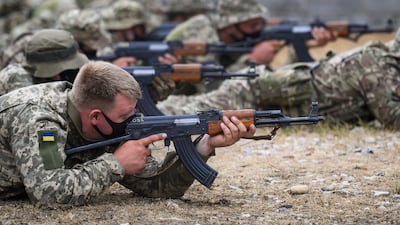The European Union is looking at creating a dedicated training mission for Ukraine's armed forces to help them repel attacks by Russia.
The EU's foreign affairs chief Josep Borrell presented the idea to the bloc's 27 defence ministers in Prague on Tuesday, hoping for a "political green light" to take the proposal further.
Mr Borrell said a joint mission would make Ukraine's training more predictable than the current piecemeal instruction that comes when particular weapons are donated.
Some EU countries already contribute to a training mission led by non-member Britain, where more than 2,000 Ukrainian personnel have been trained, while Germany, the Netherlands and others have their own programmes in place.
But several countries said they supported a separate EU mission and rejected any suggestion that Russia would treat it as an escalation of the conflict, since the bloc already supports Ukraine militarily.
"It would be good to put that on a more structured basis and to ensure that the EU collectively is doing that in a structured and organised way that can last for some time," said Irish Foreign Minister Simon Coveney.
His Finnish counterpart Antti Kaikkonen said the EU should seek "new and innovative ways" to break the stalemate in Ukraine and that a training mission might be the way to do it.
Aid from western militaries has been credited with helping Ukraine survive the first six months of the invasion, but the fallout from the war could worsen over the winter if the fighting drags on.
"What I see now is a war of attrition — both sides are not moving a lot," said Robert Brieger, chairman of the EU's military committee made up of chiefs of defence from across the bloc.
"There are some small counter-attacks from the Ukrainian side. Success of these operations will depend on the support of western nations."
Ukraine conflict - in pictures
Neutral Austria sounded one of the few notes of scepticism about the training mission, with Defence Minister Klaudia Tanner saying the legal basis and extent of the proposal required scrutiny.
But Mr Borrell believes a mission for Ukraine is overdue when the EU already has 18 military and civilian peacekeeping missions in countries such as Mozambique, the Central African Republic and Mali.
Initial approval in Prague, where foreign and defence ministers are holding three days of talks this week, would pave the way for a more detailed proposal to be considered in the autumn.
Mr Borrell is also calling for more co-ordination between EU countries in military spending, an idea embraced on Monday in a speech by German Chancellor Olaf Scholz.
The EU recently adopted a new strategic compass that set out plans for the union to grow its military presence and set up a 5,000-troop rapid response force to carry out operations such as last year's evacuation of Kabul.
But wary countries, especially in Eastern Europe, which regard Nato as their prime security protector, have been offered reassurance that a more muscular EU will not supplant the American-led alliance.












